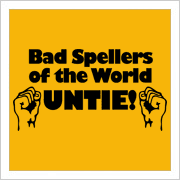Connect with us
Recent Posts
-
Deliberate Misspellings – White, Gray or Black Hat?
 There are a fair number of webmasters who advocate using misspelled words to promote traffic to a website. On the other hand a number of other webmasters denounce the practice, leading to plenty of debate on the issue which is far from settled. By deliberately optimizing your content for misspelled keywords is considered by some to be a core black hat trick others say that it is not black hat trick and merely creative thinking
There are a fair number of webmasters who advocate using misspelled words to promote traffic to a website. On the other hand a number of other webmasters denounce the practice, leading to plenty of debate on the issue which is far from settled. By deliberately optimizing your content for misspelled keywords is considered by some to be a core black hat trick others say that it is not black hat trick and merely creative thinkingSince you would not forcing the internet user to search using misspelled words the argument can be made that misspelled words are valid keywords used by the internet users. They just happen to be mistaken. It is not tricking someone, it is providing a valid outlet for their mistake which provides them with what they are looking for. Misspelled words could be considered part of the whole body of search terms that are actually input by the users even though unintentionally. Google has no penalties against optimizing for misspelled keywords at this time, and you can find websites optimized for such misspelled words being listed in the top positions. It is a common thing.
One of the reasons that many webmasters like to take this approach for optimization is that the competition for misspelled keywords is far less than for the correctly spelled words. Optimizing your pages for misspelled words would mean you are battling less competition. The most successful area of using misspelled keywords is brand names. Right or wrong, it is all a part of the game.
There are several factors that you should keep in mind before you follow this particular path. You don’t want to destroy your website in terms of professionalism by forcing a large number of misspelled words into your website’s content. It looks bad and unprofessional. This could come across to the users as a clear indication of lack of attention to detail. You do not want to turn off visitors by seeming to have shoddy content. When you try to get traffic to your website, you take care that your image is presented in the best possible light.
The best way to approach the issue is to take a page form the Google handbook itself. Instead of inserting misspelled keywords into your text, you can add pages with the misspelled words that preceded a note reading something like, “Are you looking for—-?” Users are used to this type of question as they see them in the search results page when they use wrong spellings for search. Your site stays “clean” and you still kill two birds with one stone. It is all winning!
Adding such an additional page for some of the most commonly misspelled words and directing them to the full pages of web copy with correct spelling allows you to reap the benefits of less competition without risking your website’s professionalism. Incidentally, Google has revealed that somewhere in the neighborhood of about 10% of web users do actually use misspelled words in their search queries. Google has taken to showing results for the correct spellings as well, but in some cases and with some search engines, you can still gain an advantage with misspellings.
Recent Posts
-
What are Top 2020 SEO Trends...
1.The ERA Of VOICE SEARCH Hello, 2020! Long gone are the days when we used to head over to the search engines on our desktops and
Read More -
Why Is SEO Super-Duper...
The year’s 2019! We have long laid our footsteps in this digital world. Did you know that more than 4 billion people al
Read More -
National SEO Services –...
Introduction about National SEO Services A National SEO service provider uses search engine optimization practice to enhance the
Read More






